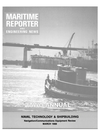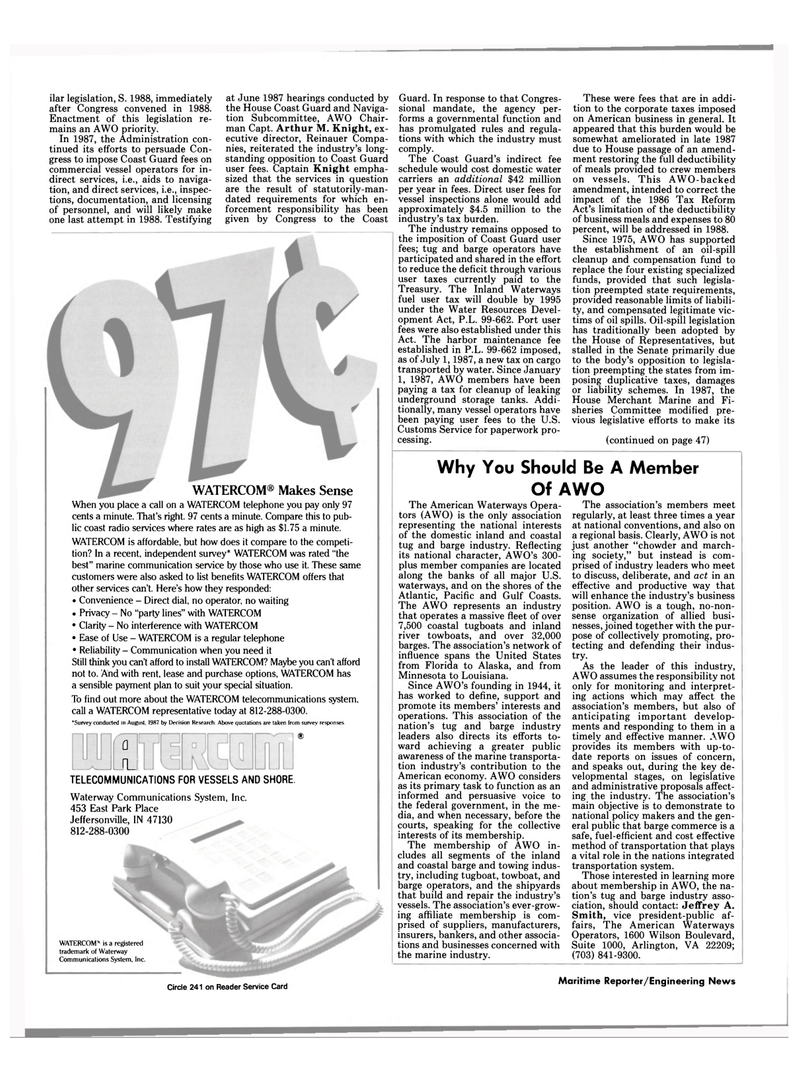
Page 22: of Maritime Reporter Magazine (March 1988)
Read this page in Pdf, Flash or Html5 edition of March 1988 Maritime Reporter Magazine
ilar legislation, S. 1988, immediately after Congress convened in 1988.
Enactment of this legislation re- mains an AWO priority.
In 1987, the Administration con- tinued its efforts to persuade Con- gress to impose Coast Guard fees on commercial vessel operators for in- direct services, i.e., aids to naviga- tion, and direct services, i.e., inspec- tions, documentation, and licensing of personnel, and will likely make one last attempt in 1988. Testifying at June 1987 hearings conducted by the House Coast Guard and Naviga- tion Subcommittee, AWO Chair- man Capt. Arthur M. Knight, ex- ecutive director, Reinauer Compa- nies, reiterated the industry's long- standing opposition to Coast Guard user fees. Captain Knight empha- sized that the services in question are the result of statutorily-man- dated requirements for which en- forcement responsibility has been given by Congress to the Coast
WATERCOM® Makes Sense
When you place a call on a WATERCOM telephone you pay only 97 cents a minute. That's right. 97 cents a minute. Compare this to pub- lic coast radio services where rates are as high as $1.75 a minute.
WATERCOM is affordable, but how does it compare to the competi- tion? In a recent, independent survey* WATERCOM was rated "the best" marine communication service by those who use it. These same customers were also asked to list benefits WATERCOM offers that other services can't. Here's how they responded: • Convenience - Direct dial, no operator, no waiting . Privacy - No "party lines" with WATERCOM • Clarity - No interference with WATERCOM • Ease of Use - WATERCOM is a regular telephone • Reliability - Communication when you need it
Still think you can't afford to install WATERCOM? Maybe you can't afford not to. And with rent, lease and purchase options, WATERCOM has a sensible payment plan to suit your special situation.
To find out more about the WATERCOM telecommunications system, call a WATERCOM representative today at 812-288-0300. 'Survey conducted in August, 1987 by Decision Research. Above quotations are taken from survey responses. fl
JU ®
TELECOMMUNICATIONS FOR VESSELS AND SHORE.
Guard. In response to that Congres- sional mandate, the agency per- forms a governmental function and has promulgated rules and regula- tions with which the industry must comply.
The Coast Guard's indirect fee schedule would cost domestic water carriers an additional $42 million per year in fees. Direct user fees for vessel inspections alone would add approximately $4.5 million to the industry's tax burden.
The industry remains opposed to the imposition of Coast Guard user fees; tug and barge operators have participated and shared in the effort to reduce the deficit through various user taxes currently paid to the
Treasury. The Inland Waterways fuel user tax will double by 1995 under the Water Resources Devel- opment Act, P.L. 99-662. Port user fees were also established under this
Act. The harbor maintenance fee established in P.L. 99-662 imposed, as of July 1,1987, a new tax on cargo transported by water. Since January 1, 1987, AWO members have been paying a tax for cleanup of leaking underground storage tanks. Addi- tionally, many vessel operators have been paying user fees to the U.S.
Customs Service for paperwork pro- cessing.
These were fees that are in addi- tion to the corporate taxes imposed on American business in general. It appeared that this burden would be somewhat ameliorated in late 1987 due to House passage of an amend- ment restoring the full deductibility of meals provided to crew members on vessels. This AWO-backed amendment, intended to correct the impact of the 1986 Tax Reform
Act's limitation of the deductibility of business meals and expenses to 80 percent, will be addressed in 1988.
Since 1975, AWO has supported the establishment of an oil-spill cleanup and compensation fund to replace the four existing specialized funds, provided that such legisla- tion preempted state requirements, provided reasonable limits of liabili- ty, and compensated legitimate vic- tims of oil spills. Oil-spill legislation has traditionally been adopted by the House of Representatives, but stalled in the Senate primarily due to the body's opposition to legisla- tion preempting the states from im- posing duplicative taxes, damages or liability schemes. In 1987, the
House Merchant Marine and Fi- sheries Committee modified pre- vious legislative efforts to make its (continued on page 47)
Why You Should Be A Member
Of AWO
The American Waterways Opera- tors (AWO) is the only association representing the national interests of the domestic inland and coastal tug and barge industry. Reflecting its national character, AWO's 300- plus member companies are located along the banks of all major U.S. waterways, and on the shores of the
Atlantic, Pacific and Gulf Coasts.
The AWO represents an industry that operates a massive fleet of over 7,500 coastal tugboats and inland river towboats, and over 32,000 barges. The association's network of influence spans the United States from Florida to Alaska, and from
Minnesota to Louisiana.
Since AWO's founding in 1944, it has worked to define, support and promote its members' interests and operations. This association of the nation's tug and barge industry leaders also directs its efforts to- ward achieving a greater public awareness of the marine transporta- tion industry's contribution to the
American economy. AWO considers as its primary task to function as an informed and persuasive voice to the federal government, in the me- dia, and when necessary, before the courts, speaking for the collective interests of its membership.
The membership of AWO in- cludes all segments of the inland and coastal barge and towing indus- try, including tugboat, towboat, and barge operators, and the shipyards that build and repair the industry's vessels. The association's ever-grow- ing affiliate membership is com- prised of suppliers, manufacturers, insurers, bankers, and other associa- tions and businesses concerned with the marine industry.
The association's members meet regularly, at least three times a year at national conventions, and also on a regional basis. Clearly, AWO is not just another "chowder and march- ing society," but instead is com- prised of industry leaders who meet to discuss, deliberate, and act in an effective and productive way that will enhance the industry's business position. AWO is a tough, no-non- sense organization of allied busi- nesses, joined together with the pur- pose of collectively promoting, pro- tecting and defending their indus- try.
As the leader of this industry,
AWO assumes the responsibility not only for monitoring and interpret- ing actions which may affect the association's members, but also of anticipating important develop- ments and responding to them in a timely and effective manner. AWO provides its members with up-to- date reports on issues of concern, and speaks out, during the key de- velopmental stages, on legislative and administrative proposals affect- ing the industry. The association's main objective is to demonstrate to national policy makers and the gen- eral public that barge commerce is a safe, fuel-efficient and cost effective method of transportation that plays a vital role in the nations integrated transportation system.
Those interested in learning more about membership in AWO, the na- tion's tug and barge industry asso- ciation, should contact: Jeffrey A.
Smith, vice president-public af- fairs, The American Waterways
Operators, 1600 Wilson Boulevard,
Suite 1000, Arlington, VA 22209; (703) 841-9300.
Circle 241 on Reader Service Card Maritime Reporter/Engineering News
Waterway Communications System, Inc. 453 East Park Place
Jeffersonville, IN 47130 812-288-0300
WATERCOM" is a registered trademark of Waterway
Communications System, Inc.

 21
21

 23
23
